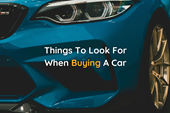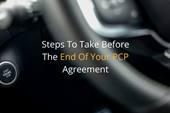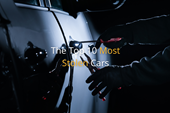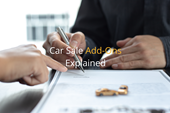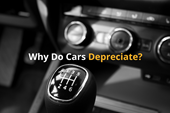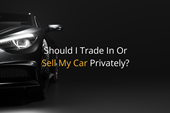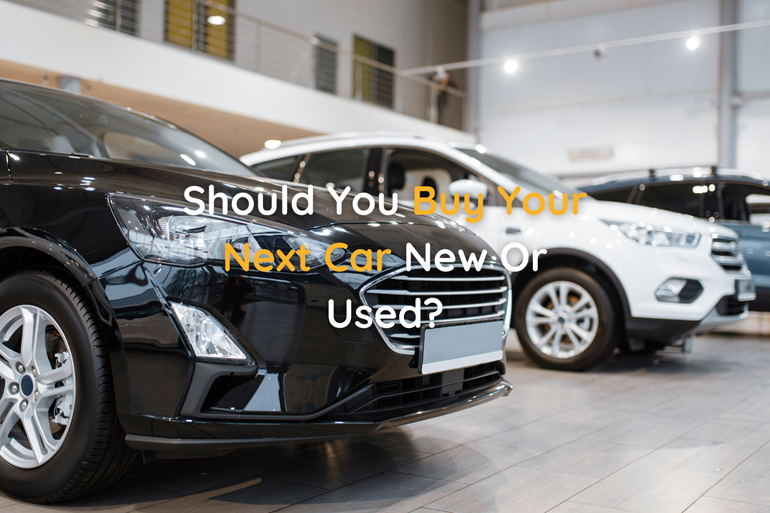
Should You Buy Your Next Car New Or Used?
New Or Used? Let's Take A Look At The Pros & Cons...
If you're looking to buy your next vehicle, you have a number of options available. Many people struggle to determine whether it's better for them to buy their next car brand new or used. To make that decision you need to know the benefits and drawbacks for both - this will give you a better understanding of which is going to be the right choice for you.
Buying a brand new car
Advantages
One of the main advantages of buying a brand new car is the opportunity to spec it to your own requirements. You can look at a dealer's list of options available on the vehicle you want and choose a number of things, such as the colour, interior trim, and optional accessories you want fitted. Overall this makes it a much more personal experience, and is the only way to ensure that you're really getting the car you have always wanted - because everything will have been chosen by you.
Something else to consider is that there will have been no previous owners, which means the car will not come with any scratches or marks that you have to think about. Many people wonder when buying a used car what kind of life it has led before they owned it, namely what kind of dirt and grime may be hiding in the carpets and under the seats. With a brand new car, you don't get any of those worries, the car comes from the factory to the dealership and then goes straight home with you.
Disadvantages
One of the primary disadvantages of buying a new car is the depreciation. New cars are constantly depreciating, and they're losing value the minute you sign the finance agreement and drive off the forecourt. Depending on the vehicle it can lose upwards of half its value, in some cases even more, over a normal three to five year finance period. That means you're buying something that is not actually going to be worth what you paid for it by the time your finance period comes to an end and you assume full ownership.
Tip: Did you know that this could cause an issue if your car is declared a total loss? When this happens, insurers often pay the value of the car at the time, not what you may still owe, leaving you liable for the difference. Think about Gap Insurance, which also covers theft, for extra peace of mind. With Gap Insurance, the difference is paid out, so you don't have to.
Another downside is that you will have to think about every nick, scratch, and mark you put in the car. These are normal parts of car ownership, especially if you have a busy lifestyle, a family, or pets to think about. It's quite disconcerting, however, to see that first scratch in your brand new car. You might want to invest in certain paint protection treatments, which can help avoid marks in your paint, or scratch and dent insurance to help repair any damage, but these are all extra costs on top of the purchase price.
Buying a used car
Advantages
The main advantage of buying a used car is that they are generally much cheaper than brand new cars. A car at the end of its first finance period that has been traded in for a new car will be three to five years old, but will be worth only half what it was new. This means if you have a limited budget or you're looking to get the most for your money, buying used is the best option. In many cases there are warranties available for cars even up to ten years old, so you can still get extra protection.
Another advantage is that you can find a car and buy it immediately. When you order a brand new car specifically to your specifications, the factory has to put it together and ship it to the dealer, the dealer has to give it a pre-delivery inspection and rectify any issues or errors, and only then are you contacted to collect it. This process can take months. When you buy a used car, you see the car you like, and if you have everything in place to buy it you can usually be driving home in it the same day.
Disadvantages
The disadvantage of a used car is that a used car is only as good as its previous owners. If you buy a used car that has not been serviced properly and has had a rough life, there's a chance it's going to be quite unreliable. In many cases, the money you saved on buying a cheaper car will be considerably overwhelmed by the costs incurred in repairing the issues with it.
Another issue with buying a used car is that you have no say in anything to do with the condition of the vehicle. Scratches, dents, damaged upholstery, for example, are all just a part of the car. You either buy the vehicle or decide to keep searching for a better one - this can limit your options to a degree if you're looking for a very particular type of vehicle with limited examples available.
Which is right for you?
There's no right answer - look at your budget, your needs, and your preferences to determine whether your next vehicle will be bought new or used. For more help with your next car purchase, consider reading our Car Buying Guide.





